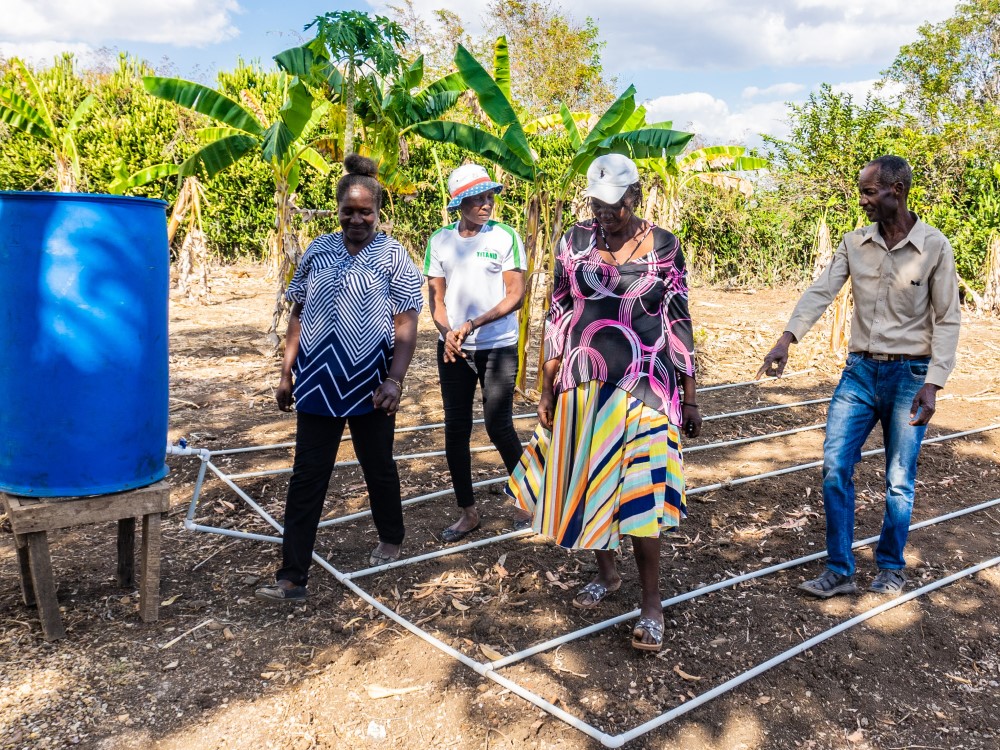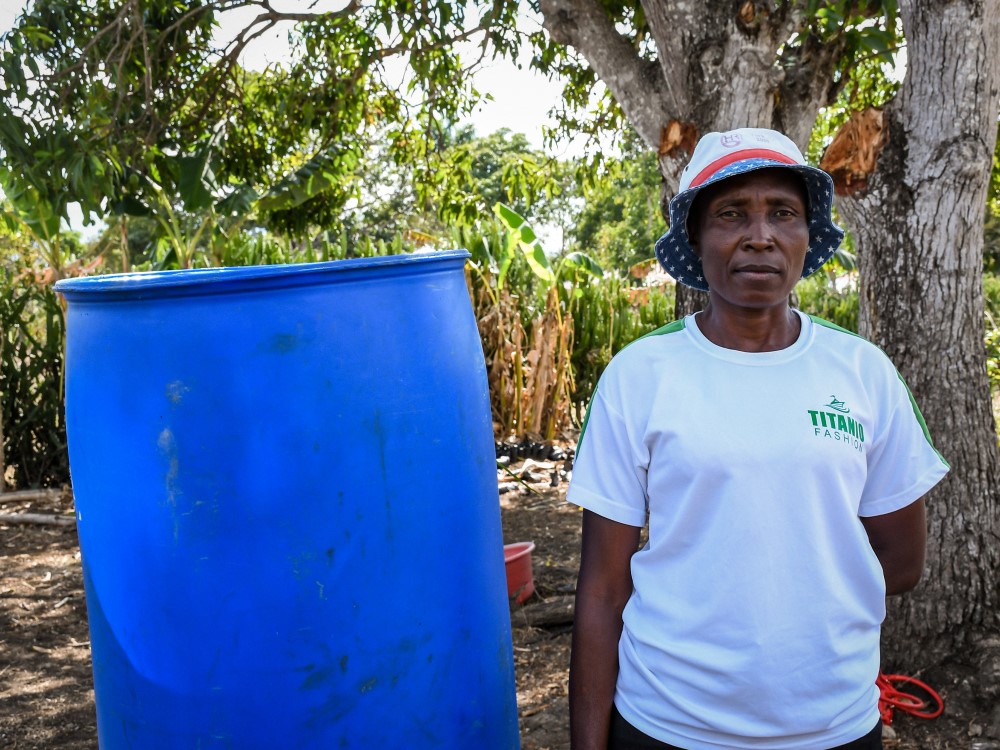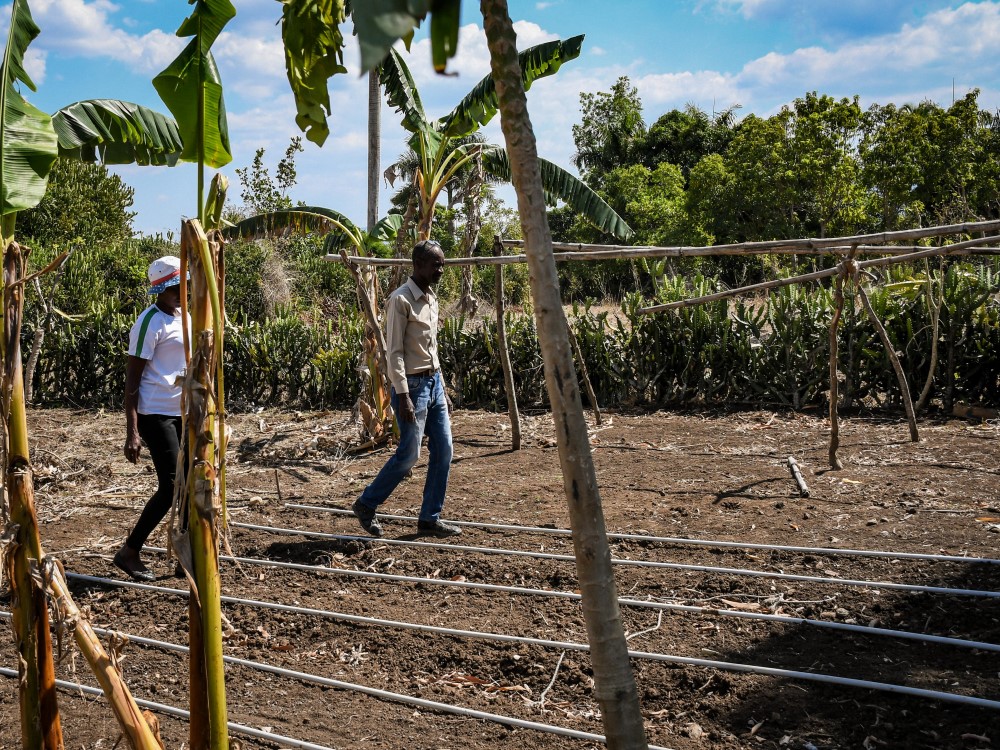Life in Haiti can be very difficult. The country faces a multitude of challenges related to poverty, political instability, and climate change, making it one of the poorest countries in the western hemisphere. A large proportion of its about 11 million inhabitants depend on agriculture, and much of it is small-scale. However, the productivity of this sector is becoming increasingly difficult to maintain as changing rainfall patterns take an increasing toll and the natural resource base continues to degrade.
Climate change effects include both drought and flooding in addition to destructive hurricanes. Agricultural production suffers, which in turn increases food insecurity, malnutrition, and the spread of diseases such as cholera.
However, it is not all doom and gloom.
The case of Silotte Mervil
Silotte Mervil, a fifty-four-year-old smallholder farmer and mother of five, is determined to make a difference on her land in Maïssade, a commune in central Haiti. She produces vegetables to feed her family and generate income, refusing to feel helpless. Her resilience and success have been boosted by her active participation in the Strengthening Agricultural Adaptation (SAGA) project, implemented by FAO. This project, financed by the Government of Quebec, aims to strengthen the resilience of the Haitian agricultural sector to climate change and to increase capacity building and adaptation planning for better food security and nutrition.


Rural communities in Haiti are finding new ways of minimizing crop losses and increasing income by implementing simple water management techniques. ©FAO/CECI
The project is supporting Silotte Mervil (above) and other Haitian farmers TO find new ways of storing water and irrigating fields. ©FAO/CECI
The impact of a simple, cost-effective, and easily transferable solution
Silotte, who is treasurer of the Champs École Nouvel Espoir, in addition to being a full-time farmer, has witnessed the positive impact of the SAGA project firsthand. “The project has allowed us to increase our harvests and our income. When we used conventional watering methods, our income was lower compared to today and we now earn a lot more money from the sale of our crops,” she says.
“With the SAGA project, we learned more efficient watering techniques for market gardens, such as the drip irrigation system using small plastic containers placed directly on the ground near the roots of the plants,” she adds.
This technique drastically reduces waste and improves the efficiency of irrigation, leading to better crop yields, increased income, and a significant boost in the quality of life for the entire community. The simplicity and affordability of the solution emphasizes how effective innovation doesn't necessarily come with a high price tag.
The SAGA project collaborates with partners in the field, notably the Centre d’étude et de coopération international (CECI), providing farmers, especially women, with the necessary support to adapt to climate change. Through the farmer field school approach, female and male farmers work together to test and implement innovative solutions that enable them to sustain production even during extended periods of reduced rainfall or drought.


Drip irrigation: Innovation does not need to be complicated to be efficient. ©FAO/CECI
The effects of climate change on Haitian women
Women in Haiti are disproportionately affected by the climate-related challenges the country faces, particularly those in the agriculture sector. This is often because women are responsible for transporting water and for much of the heavy field work. The increasing incidence of drought has worsened this and so the introduction of water-efficient drip irrigation has made a huge positive impact on Silotte’s life. She no longer has to spend as much time and energy transporting water to irrigate her vegetables. She also finds it much easier to work the land because it does not dry out.
Once a seasonal farmer, with better water management, Silotte now has more time to grow a variety of crops including vegetables like tomatoes, aubergines, and peppers all year round, empowering her as an entrepreneur in her own right and producing benefits for the entire community.

The use of new techniques and cropping calendars are helping farming communities adapt to climate change while stabilizing income. ©FAO/CECI
Inspiring the next generation of Haitian farmers
Silotte’s success story has become a beacon of inspiration for the younger generation in her community. She continues to encourage young people to get involved in similar projects, where they can acquire valuable knowledge and equip themselves to work in sync with the environment, despite climate change challenges.
Reflecting on her experience, Silotte has some advice for young Haitian farmers: “I encourage them to join a farmer field school so that they can benefit from the training we received. They would be trained to work at the same pace as us and might even do better! It is thanks to the training that we were able to diversify our practices. We learned new techniques. We now cultivate on ridges, yields from cultivation on ridges are higher and cultivation is faster. Our harvests and profits are much greater than before.”
FAO has been working in Haiti since 1978 and although there is much more that can be done to ease the burden on Haiti’s smallholder farmers, especially women farmers, there is ample evidence that despite the problems resulting from climate change, improvements to livelihoods are being made.
The case of Silotte Mervil highlights the benefits that can result from implementing innovative technologies in increasingly challenging situations.
In addition to Haiti, the SAGA project also operates in Senegal and will soon be operational in Côte d'Ivoire in its second phase.
SAGA I (2018-2023): KEY RESULTS IN HAITI
Beneficiaries: Vulnerable female and male farmers affected by the impacts of climate change and technical agents from the Ministries of Agriculture and Environment.
Six departments in Haiti where project is operational: Grande Anse, Sud, Sud-Est, Nord-Est, Centre, Ouest
- In the municipalities of Hinche and Maïssade: Over 200 farmers received support to enhance water management, agricultural planning, business management and marketing.
- In the departments of Sud-Est, Grand'Anse, and Nord-Est: 120 facilitators disseminated knowledge gained from 60 Farmer Field Schools to members, focusing on good agricultural practices integrating climate change dimensions.
- In the municipality of Camp Perrin: 280 farmers were trained in climate resilience for vegetable and fruit production; over 60 orchards were rehabilitated, and 53 were established; 6 "model" vegetable gardens were set up.
Support for the development of strategic documents on adaptation for agricultural sectors:
- A publication on the state of policies, research, and projects related to climate change adaptation in Haiti's agricultural sectors.
- A working document on the 'Guide for Planning Adaptation in Haitian Agricultural Sectors'.
- Co-organization of consultations in the departments of Nord, Nord-Est, Center, Sud, and Sud-Est coordinated by the Ministry of Environment of Haiti to gather community opinions and concerns regarding the revision of Haiti's NDC (Nationally Determined Contributions).
Capacity building activities to enhance the resilience of producers:
- Over 363 women and 254 men acting as community facilitators
- Training programs using participatory and inclusive approaches: Farmer Field Schools, agroecology, gender, land restoration.
- Support with equipment and inputs (seeds, organic fertilizers, etc.).
Assessments and databases:
- An analysis of the state of knowledge on vulnerability and adaptation in Haiti's agricultural sectors
- An assessment of the drivers for the adoption of climate change adaptation strategies by farmers and fishermen in Haiti
- A database on observations, projections, and climate scenarios for the Artibonite River basin.
More information
- Website: Strengthening Agricultural Adaptation (SAGA)
- Website: SAGA in Haiti
- Website: FAO country profile in Haiti
- Resilience through innovation in Haiti: Simple and affordable water management and cropping techniques help farmers adapt to natural disasters and a changing climate
Publications
- Brochure of the Strengthening Agricultural Adaptation (SAGA) project
- Note politique sur l’état des lieux des politiques, études et projets relatifs à l'adaptation des secteurs agricoles aux changements climatiques en Haïti
- État des lieux des politiques, études et projets relatifs à l’adaptation des secteurs agricoles aux changements climatiques en Haïti
- Fiche du projet SAGA/Project overview: SAGA in Haiti
